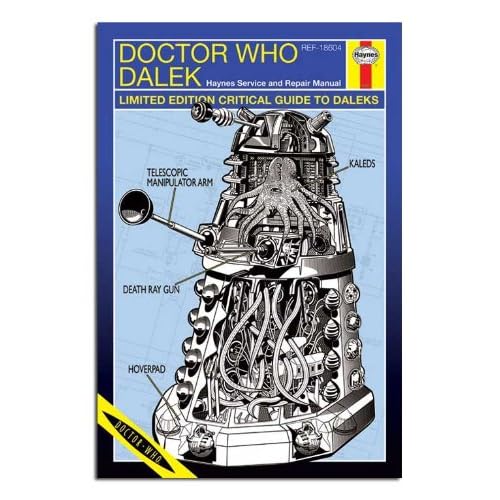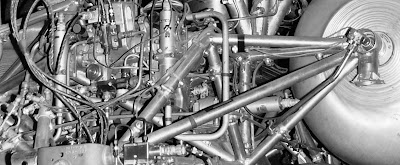A bizarre new theory aims to unite the worlds of Literary Criticism, Criminology and High-Energy Particle Physics. Doctor Martin Martin reports from outside the text.The number of cases of what appear to be false confessions to non-existent crimes has reached double figures with the recent case of
Rodion Raskolnikov who turned up at a police station in an unnamed Russian city claiming to have murdered two women but also raving that “Dostoevsky made me do it!” As with previous, similar cases across the world, no evidence of any actual crime has ever come to light: the victims appearing to be fictitious creations along with the obviously-ridiculous and made-up names of the supposed criminal masterminds behind the acts.
The phenomenon started a couple of years ago with the sudden arrival in a small West-Country police station of a woman – variously reported as being Tess or Hetty
Durbeyfield – who, after complaining that the station should be manned at all times and that she was freezing after sitting on the doorstep all night, raved about having stabbed a local man while under the influence of a shadowy, local architect-cum-author that she knows only as “Tom”. No investigations have uncovered any man of such standing and no body or proof of the crime was found.
Tess/Hetty was committed to hospital where she might have remained in obscurity had the case not caught the eye of a literary academic – Professor Arthur
McTrellis of Bangor University, who read a short account of the incident in The Daily Mail (claiming that he only saw it because it was wrapped around his fish-and-chips). Professor
McTrellis says that the case and all the others which have followed it have echoes of some common folk-tales, found in ancient communities the world-over. In these tales, the teller is often manifested in the story itself, becoming a character in his own creation, encouraging and directing the action with
skillful and subtle instructions using only slight suggestions of the path that a particular character should take. The professor had Ms.
Durbeyfield transferred to a home for the Literary Insane, near his laboratory in the shadow of the
Snowdonia National Park, where he has been carrying out a number of what he describes as “not-dubious ethically in any way … er… at all” experiments. The result of this has been a new theory of literary criticism which has been dubbed as “totally useless” both by ignorant hacks and anyone with the slightest amount of common sense.
This thesis was reinforced, when a number of women claiming to be sisters, arrived at council offices in Liverpool asking to be housed after they were thrown out by their father. Five of the women purported to be sisters of the surname
Bennet while a sixth woman who would only give her first name of Jane, accompanied them, rarely speaking, instead preferring to write in a small notebook which she always carried. Jane also appeared to have a sinister sway over the
Bennets and seemed in some way able to control their actions at a whim. Council officials were suspicious of this behaviour and the police were called though no charges were brought. The sisters and their mysterious director are thought to be living in two flats in a
Bootle tower block with reports that they are visited regularly by soldiers and various moneyed, idle layabouts from the Home Counties.
Two women of similar standing were arrested after an altercation on a street corner in
Hebden Bridge when one of the women a nervous, well-spoken, sombrely dressed lady, attacked the other woman, described by onlookers as “
harridanous” (Google does not recognise this word – Ed.) for “looking at her funny”. The more passionate of the two, variously called “Kate” or “Kathy” or “Katherine” was heard to rave in return about the other, who she called “Janet” or “Jane” as having not been satisfied with one man and accusing her of catching the affections of her intended, an unnamed man of Gypsy extraction. Both women were taken into custody where they were allowed to cool off over night before being released into the care of the local book group, who claimed that the women were local and known to them. Before leaving the station, a further incident occurred when there was competition for the affections of the desk officer, Sergeant Rochester-
Heathcliff, who himself began raving as if directed by some outside agency. Katherine was heard to shout “those bloody
Bronté women should leave us alone!” but the incident was brought to conclusion by the intervention of the Superintendent, who grabbed both women and forcibly ejected them into the street and the care of a Mrs
Gaskell. There was a further brief scuffle as Katherine tried to escape onto the moors but Mrs.
Gaskell (a big woman it has to be said) rugby tackled her charges, telling Kathy to “shut her North and South”, and marched them away in the direction of the library.
Professor
McTrellis has recently, completed a six-year study of these various occurrences and come up with a deep and complicated theory worthy, in this writer’s opinion, of the worst French Post-Modernist claptrap. These incidents are, in his terms, a situationist strange loop, the result of excessive deconstruction of the novel, something which he claims began with what many people consider to be the first true modern novel, - that one about the old guy and his noble, but uneducated sidekick – you know the one, the bloke who sees windmills and tries to knock them down by charging them with a big stick – (look it up in Wiki later . Ed.) In conjunction with poor-dead Jacques Derrida, Professor
McTrellis has been able to create some of his own characters in physical space by treating various ancient parchments with beams he captured in an empty coca-cola bottle while in the car-park of the Large Hadron
Collider in Switzerland. He has managed to capture blurry images of these characters but the experiment has often had to be abandoned before full corporeal presence is achieved because of the overwhelming smell of chocolate, a side-affect, the professor claims, of a bizarre accident with the coke bottle and a cuckoo clock while returning from the continent. Hopes are high that the next stage of the experiment, for which, it is envisaged, that
CERN and the
Tevatron accelerator in Illinois will join forces to provide a more-reliable source of deconstruction beams (and a full two-litre coca-cola bottle), will actually result in some permanent physical presence. However,
McTrellis is aware of his own literary short-comings and has been canvassing several well-known authors to provide the raw,
un-analysed text necessary for success. To-date, only Martin
Amis has replied but has been rejected on the grounds that he has already appeared in one of his own novels – Money – 1984, and as a result might well, in the professor’s words –“disappear up his own
fundament should he be exposed to the beams – if indeed he
hasn’t already.”
There is a shadow on the horizon of this wonderful, new theory in that
McTrellis broke with Derrida shortly before his death. He was interviewed for a French news programme during which he described Derrida as a “crazy French pansy.” He said “Derrida is a useless, ignorant philosopher who sprinkles his work with extraneous equations using pi and square roots, that sort of thing, all of which are useless in the description of text. Everyone with an ounce (or should I say gram being in Europe) of common sense knows that pi and square roots are only to be used for round and ... er… square things respectively. As most novels, poems and other literature are built around triangles, the only branch of mathematics at home in the world of literature is trigonometry.” A member of the audience then stood up and claimed that complex numbers had been very useful in his understanding of the Paris Metro timetables and that he was leaving France to work for London Transport. At this point
McTrellis seemed to take on a glazed look which he later explained was the result of the memory of a girl he once met on the tube but who had ignored him completely until he took out his trusty copy of “the Third Policeman” whereupon she fell on him. It was only later that he discovered that she had stolen his membership card to The British Library and the lock of hair purportedly shaved from James Joyce’s head before his eye operation. The interview thus ended in farce and was written up in the Paris Journal of Philosophy with the help of seventeen mathematicians and a plasterer from the Sorbonne.
However, the professor is desperate to retrieve some crucial notes that he believes Derrida took back with him after the falling out and is certain that these notes reside amongst Derrida’s papers which are stored along with various bits of other famous Frenchmen in disparate locations around Paris. To this end he has canvassed for the support of the French First lady who he thinks is much more likely to “have read books and stuff” than her husband who “looks like he probably struggles to complete the back of a cornflakes packet”. We are all waiting for the outcome of this petition with … well we are all waiting for it anyway.
The professor’s current field of study is by far the strangest case of literary cross-over so far. In
Basingstoke, a man known only as Proust turned up at a police station, claiming to have lost his characters and raving about Swans. This case differs from the rest in that it appears that the only manifestation of the work in question appears to be the writer himself, there being no characters in existence, or none that anyone can remember anyway. Proust was offered a biscuit at the start of his interview but on his first taste (It was apparently a hob-nob - the most comedic of biscuits.) began to spout, at length, the details of his entire life in relation not only to biscuits, but in fact to all
confectionery. He was eventually silenced by an injection of Nembutal given by the police surgeon, but only after a discourse on Florentines during which it became obvious that both the First and Second World Wars could have been avoided by increasing the butter-to-flour ratio of these most luxurious of delicacies.
McTrellis was brought in to give assistance to local writers hoping to avoid future wars but told them he was a structuralist (or post-structuralist – at least something with structuralist in it) and “not a bloody historian!” Eventually Constables Chapman,
Palin and Idle were brought in on overtime to
precé the text, going on to win first prize at the local Fete for their searing translation.
The Proust episode might well be the most interesting of the incidents reported so-far, but the most poignant is undoubtedly that of the so-called Joyce Brothers, who were found very much the worst for wear, spread across at least five Dublin drinking dens, a feat of utmost cleverness being that there are only two of them. After being reassembled at the Central Police station, they were transferred to the Department of Supreme Cleverness at Trinity College where they were put inside an anechoic chamber and studied intently by at least six
Flann-O’
Brienn disciples using both modern technology – lasers and stuff like that – and more traditional methods like pen and paper. It eventually became clear that although the police had assumed that they were brothers with the surname Joyce, they were in fact unrelated, one being called Bloom and one being Finnegan. Gradually a difference in style was noted, in that Bloom spoke incoherently and Finnegan spoke more incoherently. Such was the extent of the garbled utterances from both the “brothers” that their mode of speech was ascribed the highest technical definition available to such texts, i.e. absolute and utter tosh. Occasionally, a few words would be recorded that did seem to make some sort of sense. Finnegan was heard to remark that Bloom spoke gibberish to which Bloom replied that he wondered whether Finnegan was actually dead yet. Finnegan’s sentences where eventually discovered to be circular but of a long period – one novel’s worth in fact, a discovery which nearly took the life of one young undergraduate who stayed awake for three days before he caught Finnegan repeating himself. It was also clear that both men were lovesick and with help from the constabulary and the
Taoiseach herself, Molly Bloom, Bloom’s wife was located. On arrival at the Department of Supreme Cleverness, she was given the standard non-mad person’s test of grammar and other stuff to do with writing, which she failed miserably, apparently having no knowledge of commas, full stops or indeed any punctuation at all. She was reunited with Bloom but was under the impression that she would be allowed to take him home for a shave. When told that he was still technically in custody, she asked what sort of sentence he might receive. The head of the department said that he
wasn’t sure exactly but that it would probably be a long one. Mrs Bloom replied that she
didn’t have a problem with long sentences and left mumbling “
mmmmmmmmm yes”.
McTrellis is convinced that the Joyce Brothers hold the key to the whole mystery and is currently working on further tests to determine how solid their existence actually is.
The last case before
Raskolnikov’s is indeed interesting, in as much as all of the known cases are completely outside the ragged line that defines literature these days. Everyone has a novel in them, the trouble is that for most people it is a turgid, sprawling mess of thinly-disguised autobiography, riddled with mistakes and a certain suspension of self-belief that manages to keep us all at it until we realise that we are too old to be writing about that nice girl we met in our twenties or how we once went snow-boarding with the drummer from Ride – it’s always the drummer from ride – he must have met so many people. This last case defined the worst indulgences of literary ambitions, coming from the pen of an apparent genius of epic vision and pristine literary ability. Unfortunately, it appears that the manifestation of this writer’s work in our world has somehow failed; the process has mixed up all of his characters and spat them out to us as a mess of corseted posh people, the men as well, who sit around in drawing rooms and take the offer of an Umbrella as some sort of obscene suggestion. They take interminable teas and say nothing of note because the thread of the story has been mixed up like a fault in a matter transporter. This single work, apparently the conglomeration of four or five novels, is intriguing and ultimately disappointing because we cannot identify the story; it is lost and we cannot tease out the meaning. This is not helped by the fact that the materialisation of characters has occurred at random locations around the world without any consistency of authorship. Professor
McTrellis has attempted to document all of the characters of which he has become aware but his Excel spreadsheet is now full. I note a short expression of tiredness on his face as I ask again what he thinks the meaning of it all actually is. He slumps in his luxurious desk chair and then with resigned despair, he leans across and punches me in the face.
I was escorted from the building by security but as I was thrown out of the college gates, the porter beckoned me back. “He’s like that with everyone” he said and then he winked. Was this a suggestion that
McTrellis was actually a character in one of his own investigations? I pressed the porter for more information from the safety of the other side of the gates, but got no more than another wink. A whole new area of investigation is opened up.
This week Martin attended Casualty in Bangor but found out that
McTrellis, the git, has had me banned from what turns out to be his show.
 A few posts back I linked to an article at The Time online which purported to be by Philip Pullman and was written as a literary sneer at the very things which Jack Straw said in the other article I linked to. Pullman's piece has been pulled (er... man?) which does seem slightly suspicious given the content. You may read a copy of the article here. I have headed my piece with the same title as the original. Many people have gone further and added the whole article to their own blogs and hence if there is any less-than-innocent reason for its disappearance, the full force of The Streisand Effect can be felt.
A few posts back I linked to an article at The Time online which purported to be by Philip Pullman and was written as a literary sneer at the very things which Jack Straw said in the other article I linked to. Pullman's piece has been pulled (er... man?) which does seem slightly suspicious given the content. You may read a copy of the article here. I have headed my piece with the same title as the original. Many people have gone further and added the whole article to their own blogs and hence if there is any less-than-innocent reason for its disappearance, the full force of The Streisand Effect can be felt.


















